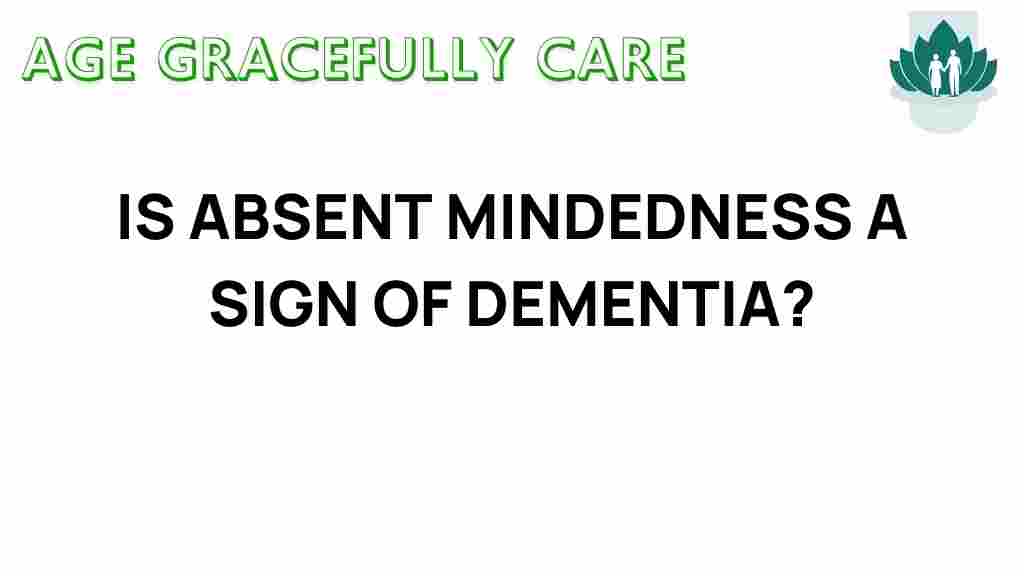Is Absent Mindedness a Hidden Indicator of Dementia?
As we age, many of us notice that our memory isn’t as sharp as it used to be. One common experience is absent mindedness, which can manifest as forgetting where you placed your keys or losing track of a conversation. While these instances are often brushed off as typical signs of aging, they can sometimes point to more serious issues, such as dementia. In this article, we’ll explore the relationship between absent mindedness and dementia, including cognitive decline, memory loss, and other early signs that could indicate a shift in brain health.
Understanding Absent Mindedness
Absent mindedness is often characterized by lapses in memory and attention. It can occur in various situations, such as:
- Forgetting names or appointments
- Misplacing objects frequently
- Getting lost in familiar places
- Having difficulty concentrating on tasks
While these behaviors can be frustrating, they are not always a cause for concern. However, understanding when absent mindedness becomes a signal of cognitive decline is essential for maintaining mental health as we age.
The Connection Between Absent Mindedness and Dementia
Dementia is a term that encompasses various cognitive disorders, including Alzheimer’s disease, which is the most common form. One of the hallmark symptoms of dementia is memory loss, which often begins subtly and becomes more pronounced over time.
It’s important to differentiate between normal absent mindedness and the absent mindedness associated with dementia. Here are some key differences:
- Normal Aging: Mild forgetfulness and absent mindedness are typical as we age.
- Dementia: Forgetfulness that interferes with daily life, such as forgetting important events or conversations.
Early Signs of Dementia
Recognizing early signs of dementia can lead to timely intervention and management. Some common early indicators include:
- Increased absent mindedness and forgetfulness
- Difficulty with problem-solving and planning
- Confusion about time and place
- Withdrawal from social activities
- Changes in mood and personality
If absent mindedness is accompanied by these symptoms, it may be worthwhile to consult a healthcare professional for a thorough evaluation.
Understanding Cognitive Decline
Cognitive decline refers to a gradual decrease in cognitive abilities, including memory, reasoning, and judgment. This decline can be a normal part of aging, but it can also be indicative of underlying conditions such as dementia. Factors that contribute to cognitive decline include:
- Aging
- Genetics
- Chronic health conditions
- Substance abuse
- Lack of mental engagement
Maintaining brain health is crucial for reducing the risk of cognitive decline and dementia. Engaging in mental exercises, social interactions, and physical activity can positively influence cognitive function.
Promoting Brain Health
To keep your brain healthy and potentially ward off dementia, consider incorporating the following habits into your lifestyle:
- Regular Exercise: Physical activity increases blood flow to the brain and can improve cognitive function.
- Healthy Diet: A balanced diet rich in fruits, vegetables, whole grains, and omega-3 fatty acids supports brain health.
- Mental Stimulation: Engage in puzzles, reading, and learning new skills to keep your brain active.
- Social Engagement: Maintaining social connections can help reduce feelings of isolation and support mental well-being.
- Quality Sleep: Adequate sleep is crucial for memory consolidation and overall cognitive health.
Troubleshooting Absent Mindedness
If you or a loved one is experiencing absent mindedness and are concerned about dementia, here are some steps to take:
Step 1: Self-Assessment
Reflect on the frequency and severity of absent mindedness. Ask yourself the following questions:
- How often do I forget important dates or appointments?
- Do I struggle to remember recent conversations?
- Is my absent mindedness impacting my daily life?
Step 2: Document Changes
Keep a record of memory lapses and any additional symptoms. This documentation can be helpful when discussing concerns with a healthcare professional.
Step 3: Consult a Professional
If you notice a pattern of absent mindedness or other cognitive issues, it’s essential to consult a healthcare provider for a comprehensive evaluation. They may recommend:
- Cognitive assessments
- Blood tests to rule out other health issues
- Brain imaging tests, such as MRI or CT scans
Step 4: Explore Treatment Options
If diagnosed with dementia or another cognitive disorder, there are various treatment options available. These may include:
- Medications to help manage symptoms
- Therapeutic interventions, such as cognitive behavioral therapy
- Support groups for patients and caregivers
Understanding Alzheimer’s Disease
Alzheimer’s disease is a progressive form of dementia characterized by memory loss, confusion, and changes in behavior. Early signs of Alzheimer’s may include:
- Forgetting recently learned information
- Asking the same questions repeatedly
- Getting lost in familiar places
If you suspect that you or a loved one may be experiencing signs of Alzheimer’s, it’s crucial to seek medical advice promptly. Early diagnosis and intervention can significantly improve quality of life.
Conclusion
Absent mindedness can be a normal part of aging, but it can also serve as a hidden indicator of dementia or cognitive decline. By understanding the differences between normal forgetfulness and concerning symptoms, individuals can take proactive steps to maintain their brain health. Engaging in healthy lifestyle choices, seeking early evaluation, and staying informed about the signs of dementia can lead to better outcomes for mental health as we age.
If you are concerned about absent mindedness or other cognitive issues, don’t hesitate to consult a healthcare professional. Remember, early intervention is key.
For more information on brain health and cognitive decline, check out this Alzheimer’s Association resource. Additionally, you can read about mental health strategies here.
This article is in the category Health and created by AgeGracefullyCare Team
